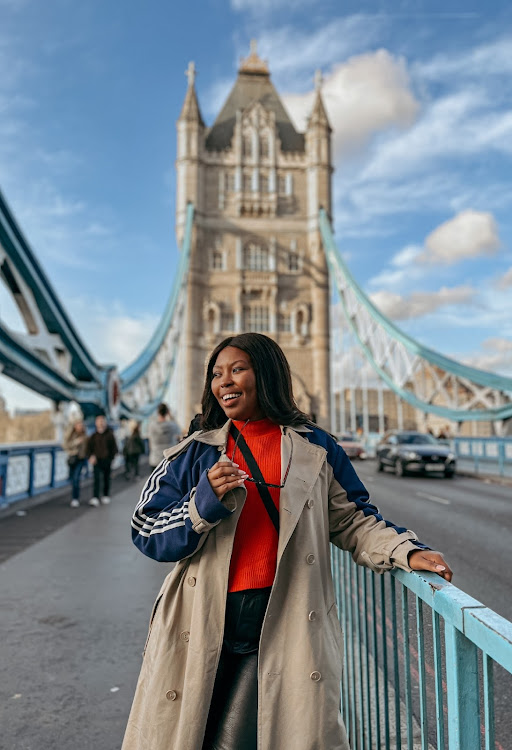
Image: Nokubonga Thusi
When London calls, you answer… especially if it comes with an opportunity of a not-to-be-missed trip.
This particular call came unexpectedly during a long weekend and with less than a week to get travel documentation ready and suitcases packed; it’s safe to say that the pre-trip jitters were in full effect. However, I felt that it was going to be a special experience to be a part of Dove’s 20th nniversary of Real Beauty.
For the past 20 years, the personal care brand has been calling for change in the beauty industry with the first Real Beauty campaign in 2004 – featuring everyday women of all shapes and sizes and not models as the industry had been doing.
After a connecting flight via Doha, Qatar, and close to 16 hours of travel, our plane finally landed at Heathrow Airport. I arrived in the land of the royals, red double-decker buses, tea and scones, red telephone booths and Big Ben!
It’s a typical spring day in London, with its signature grey skies and a gentle yet chilly breeze nipping at the skin. After checking into The Bailey Hotel in Kensington, with American Boy by Estelle and Fergie’s London Bridge on repeat in my head, I’m joined by fellow South Africans Zuraida Jardine, Botlhale Boikanyo and Mpoomy Ledwaba in exploring the city.
After visiting iconic landmarks, Buckingham Palace, Tower Bridge, London Eye, Big Ben, Covent Gardens and Westminster Abbey, it was time to kick off the anniversary celebrations. What better way than with a welcome dinner hosted by Dove global vice-president, Firdaous El Honsali, at Madera Treehouse Hotel, a Mexican-inspired culinary delight that felt like a luxury Cancun rooftop resort, complete with astounding views of London by night.
The next day, there was a luncheon hosted at Daroco, Soho, where a panel featuring the original cast of the first Dove Real Beauty campaign discussed its impact on women 20 years ago and shifting representation.
As the day continued, we moved into the second part of the event – an immersive experience where we were transported into a digital world. The space was lit up with an intimidating, piercing white light from screens covering the high walls and ceiling; then displaying AI imagery and search prompt questions asking, “which woman is real?” and “am I beautiful?”.

Image: SUPPLIED
A second panel discussion was hosted by journalist Ateh Jewel and Honsali, joined by singer Jessie J, creative AI director at Artymingle Intelligence, Kathryn Webb, as well as consultant and professor of psychology at the Centre of Appearance Research, prof Phillippa Diedrichs. Dove revealed its new initiative and campaign ‘The Code’ that focuses on tackling the harmful effects that AI-generated imagery has on beauty standards and representation.
Imagine a world where we all looked the same? Where we could never have those little nuances in our appearance that inspired conversation starters like “wow, I love your freckles” or “your eye colour is beautiful” or we never marvelled at the complexity and uniqueness of skin?
Studies found that by 2025, AI is predicted to generate 90% of online content and though this may sound exciting in terms of technological advancements, it has harmful implications for how women will view their appearance and global beauty narratives.
Diversity and representation in the beauty industry has always been a challenge but with the effects of social media and digital technologies, particularly AI, causing a shift in modern beauty standards, the threat of its harmful impact on beauty standards, diversity and identities is eminent and a cause for concern.
Sharing statistics such as “1 in 3 women feel pressure to alter their appearance because of what they see online, even when they know it’s fake or AI generated” and visuals that showed how AI generated multiple images of blonde-hair-blue-eyed beauty when asked to imagine “the most beautiful woman in the world” – the bias of AI, if not unlearned, could result in the idolisation of a more Eurocentric beauty standard and the erasure of African, Asian, mature or biracial beauty features as the world continues to become more digitised.
Taking a stand against beauty misrepresentation, Dove pledged to never use AI-generated imagery in any of its beauty campaigns to create or distort images of women and to broaden the beauty database that AI learns from in an effort to protect the diversity, authenticity and unique beauty representation of every women and girl for years to come.
As I sit typing this, bundled up in a hoodie and socks, back in sunny SA that has since developed an autumn chill, I am reminded of the community of women that Dove brought together in London – a sense of sisterhood that seemed to brighten up even the cloudiest London day, a rallying spirit and honest conversations over the dinner table that sought to encourage, inspire and advocate for each woman’s real beauty.
Make no mistake, the world is evolving and we have no choice but to progress with the times. But as with any technological advancement – there is a choice to use it for good or harm. While there are also just as many studies looking into how AI can help push the beauty industry forward – the current state of AI should not be ignored.
Thusi was a guest of Dove

Image: Nokubonga Thusi
